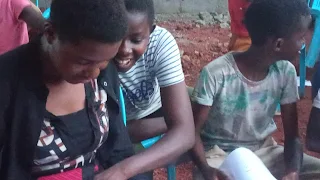Hatchery Bulletin
October 2025 “From Mud to Miracle: Building a
Future, One Pond at a Time”
🌿 From Groundwork to
Growth
This month, our team transformed raw land into thriving
hatchery zones:
✅ Natural ponds fenced
with wood and plastic-lined sealed to protect fish from predators
✅ At the 2meters by 3 meters nursery
pond, we cleaned the tank and monitored for algae balance
✅ Manual excavation we also dug
one pond this month.
“We shape the earth, and it shapes our future.”
💧 Water &
Fertilization Update
- Cow dung drying. We got cow 600kg of cow dung from a local farmer
and applied it in to the pond in order to fertilize and encourage growth
of natural plankton for the fish underway for natural pond fertilization
- Green water monitored to balance algae and oxygen levels. Too much
growth of Algae will block the air circulation hence encouraging accumulation
of ammonia gas which will kill the fish.
🐠 Fish & Feed Trials
- Yellow tilapia spotted—a sign of healthy pond conditions
- Feed trials launched using local materials which we purchased cheaply at the local market we were able to make fish feed. The ingredients we purchased include, 10kg soya beans, 5kg cassava flour, 5kg, sunflower cake, 2kg salt, 2kg premix, 10kg maize bran, and 20kg Mukene . these ingredients are mixed and cooked with 20 litters of water then dried on tappoon for 5-7 days . then grinded to the required size for the fish
- Raised drying trays introduced to improve feed hygiene and reduce
mold
📚 Training & Tools
- ✏️
Youths trained on pond measurements, we measure 1.5X2 meters demonstration pond
and also calculated the feed conversation ratios, and stocking plans
- 📒
Handwritten logs used to track daily routines and monitoring water parameters
💬 Voices from the Team
- "Working
in the mud is tough, but seeing the fish grow makes it worth
it."
— Grace Bagalwa (Deaf).
"We’re not just farming
fish—we’re building futures and Making Jesus Known"
— Afayo, Coordinator
📌 Next Steps
- Digging
water reservoir to supply fresh
water in the pond
- Making
40kg of Fish Feed which will last for 2 months.
- Sampling
to be done in order to monitor growth rate of the fish to avoid predation
- Slashing
around the pond to prevent intrusion of predations into the pond














